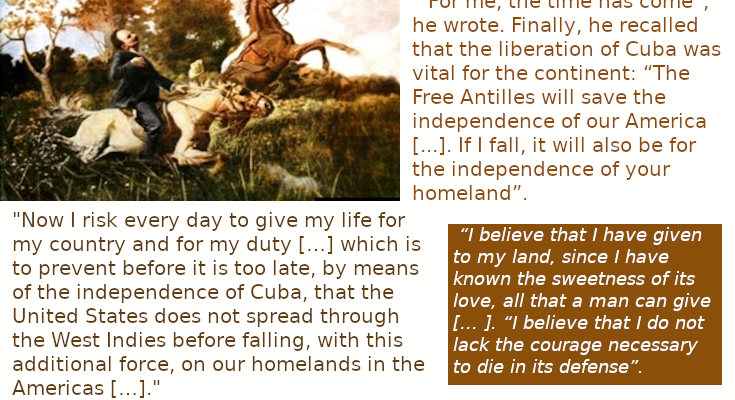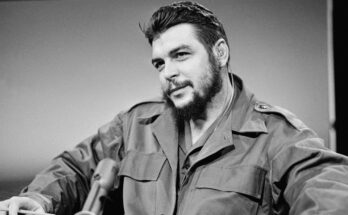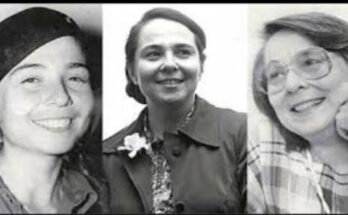Following the so many times José Martí referred to his imminent death once in the battle field, it is apparent his conviction of coming to Cuba and face the reality of a war, even though he was in no way trained to do so. He understood the situation was leading him to take the challenge.
In a letter, written to his Dominican friend Federico Henríquez y Carvajal, Martí explained the reasons why he had a moral duty to fight alongside revolutionaries. It was not possible to preach to his people the need to die for freedom if he was not willing himself to risk his own life. “For me, the time has come”, he wrote. Finally, he recalled that the liberation of Cuba was vital for the continent: “The Free Antilles will save the independence of our America […]. If I fall, it will also be for the independence of your homeland”.
Martí also wrote a farewell letter to his mother and reminded her, in the face of her grief as she saw her son ready for the ultimate sacrifice, that “a man’s duty is to be where he is most useful”. Asking for her blessing, he transmitted this last message to her: “Never will a work come out of my heart without piety or purity”.
In a letter of April 1, 1895 to Gonzalo de Quesada, Martí justified his participation in the combat, as a man of thought: “You know very well that serving is the best way to speak”. In another letter to Enrique Collazo, Martí reiterated his disposition to the ultimate sacrifice: “I believe that I have given to my land, since I have known the sweetness of its love, all that a man can give [… ]. I believe that I do not lack the courage necessary to die in its defense”. In another exchange with his patriotic friend Fernando Figueredo, Martí recalled the sacrifices made: “I have given everything to my homeland, including the peace of my home”, in reference to the forced separation with his wife and son who have returned for good. in Cuba in the early 1880s.
On April 11, 1895, José Martí disembarked at La Playita, near Cajobabo, in the eastern part of the island, in the company of Máximo Gómez and they were received by members of the local guerrilla. A few days later, on April 15, the Main independence leaders, on the proposal of Máximo Gómez, decided to appoint Martí Major General of the Liberation Army. “What a privilege to live among men in their time of greatness”, he wrote.
Martí was aware of the political and economic situation in Spain and of the balance of power between royalists and separatists. In a letter to the patriot Bartolomé Masó of April 25, 1895, he noted that the enemy “did not have sufficient elements either on the island or abroad to support his long and costly campaigns, and even less to achieve any victory”. Moreover, the population’s support for the revolutionaries was unanimous: “The veterans admit that they have never received similar aid from the country”.
On April 26, 1895, Máximo Gómez and José Martí sent a bill to all the independence leaders to remind them of the principles that paved the way for the armed uprising. Patriots were to oppose “unnecessary devastation and unnecessary violence”. Weapons would only be laid down by insurgents with “recognition of the country’s independence”. The bill ratified the Cubans’ aspiration for dignity:
An American people like Cuba, with their own character and elements of life, capable of governing themselves through the culture and the labor of their children and united after slavery in the sacrifice of war cannot continue to live in the servitude of a distant people like the Spanish […]. The war for the independence of a people and for the dignity of humiliated men is a sacred war, and the creation of a free people that we conquer with it is a universal service.
Two days later, on April 28, Gómez and Martí recalled the war policy which was to animate the patriots. “The war must be genuinely generous, free from all unnecessary acts of violence against people and property, and from any display or indication of hatred towards the Spaniard”. People originally from the Iberian Peninsula and settled in Cuba had to feel “the confidence that they will be able to live peacefully in Cuba after peace”. Finally, prisoners of war should be released “alive and grateful”.
On May 18, 1895, the day before his sacrifice in battle, José Martí wrote his last letter to his Mexican friend Manuel Mercado. He expressed his deep fears to him: “Spain would rather come to an agreement with the United States than to give the island back to the Cubans”. It was absolutely necessary to avoid “the annexation of Cuba to the United States”. He denounced Washington’s desire for domination:
Now I risk every day to give my life for my country and for my duty […] which is to prevent before it is too late, by means of the independence of Cuba, that the United States does not spread through the West Indies before falling, with this additional force, on our homelands in the Americas […]. These minor and official obligations which are peculiar to the peoples […] most vitally interested in preventing Cuba, on the occasion of its annexation by the imperialists of the North and because of the Spaniards, from being opened the way – which must be obstructed and that with our blood we will obstruct – of the annexation of the peoples of our America to the restless and brutal North which despises them.
On May 19, 1895, José Martí fell in the field of honor at the age of 42 in a clash with Spanish troops at Dos Ríos, while he was in the company of Máximo Gómez and Bartolomé Masó. Refusing to remain in the rearguard, Martí separated from his troops with his aide-de-camp Angel de la Guardia and charged on the Spanish army.
He was then hit with three bullets which caused fatal injuries. Spanish captain Antonio Serra Orts, who was in command of the troops, expressed his amazement upon discovering the identity of the Cuban leader: “My God! Why was Martí fighting in the vanguard? How is it possible that a future President of the Cuban Republic is fighting like a guerrilla?”.
Only challenge and honor led to the decision of dying when Martí would actually be more useful alive and protected that in the battle field where he had no opportunity to survive. Much more research must be done to reveal in inner side of the facts around Martí´s death.




